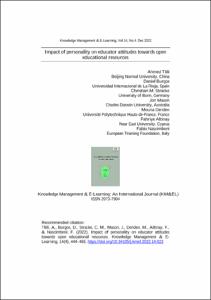Impact of personality on educator attitudes towards open educational resources

Impact of personality on educator attitudes towards open educational resources

| dc.contributor.author | Tlili, Ahmed | |
| dc.contributor.author | Burgos, Daniel | |
| dc.contributor.author | Stracke, Christian M. | |
| dc.contributor.author | Mason, Jon | |
| dc.contributor.author | Denden, Mouna | |
| dc.contributor.author | Altinay, Fahriye | |
| dc.contributor.author | Nascimbeni, Fabio | |
| dc.date.accessioned | 2023-01-19T13:15:26Z | |
| dc.date.available | 2023-01-19T13:15:26Z | |
| dc.date.issued | 30.12.2022 | |
| dc.identifier.uri | https://hdl.handle.net/20.500.11811/10589 | |
| dc.description.abstract | The emergence of open educational resources (OER) represents one of the most significant educational developments in the 21st century. Given their capacity to be freely adapted, re-used, and shared in different contexts, OER expand the options for educators. This paper reports on an initial study concerning such choices in which educators’ personalities are investigated in relation to the OER adoption. Choosing open approaches has been shown to correlate with personal attitudes and several studies have highlighted the potential and need for investigating how personality might affect OER adoption. To address this gap, this study investigates the impact of educators’ personality differences in relation to OER adoption. The analysis focuses specifically on the perception towards OER and the intention to use OER using the Five-Factor Model (FFM) to identify educators’ personalities. Following a mixed methods approach, data collected from university educators using questionnaires (57 respondents) and interviews (15 respondents) are discussed in a two-stage hierarchical regression analysis. Demographic variables (age and gender) do not show any significant relationship. Findings reveal that while the explored five personality dimensions do not have an impact on the educator attitudes towards OER, they seem to have a significant impact on their intention to use OER. Specifically, only three personality dimensions – namely, extraversion, agreeableness, and openness – have a significant impact on the intention to use OER. This shows that ‘open attitude’ (mixing extraversion, and agreeableness, and openness) may be a fundamental prerequisite for educators to engage in open teaching practices, including the use of OER. | en |
| dc.format.extent | 23 | |
| dc.language.iso | eng | |
| dc.rights | Namensnennung 4.0 International | |
| dc.rights.uri | http://creativecommons.org/licenses/by/4.0/ | |
| dc.subject | Personality | |
| dc.subject | Five factor model | |
| dc.subject | Big five inventory | |
| dc.subject | Open education | |
| dc.subject | Teacher training | |
| dc.subject | Educator attitudes | |
| dc.subject | Open educational resources | |
| dc.subject.ddc | 150 Psychologie | |
| dc.subject.ddc | 300 Sozialwissenschaften, Soziologie, Anthropologie | |
| dc.subject.ddc | 370 Erziehung, Schul- und Bildungswesen | |
| dc.title | Impact of personality on educator attitudes towards open educational resources | |
| dc.type | Wissenschaftlicher Artikel | |
| dc.rights.accessRights | openAccess | |
| dcterms.bibliographicCitation.volume | 2022, Vol 14 | |
| dcterms.bibliographicCitation.issue | No. 4 | |
| dcterms.bibliographicCitation.pagestart | 444 | |
| dcterms.bibliographicCitation.pageend | 465 | |
| dc.relation.doi | https://doi.org/10.34105/j.kmel.2022.14.023 | |
| dcterms.bibliographicCitation.journaltitle | Knowledge Management & E-Learning | |
| ulbbn.pubtype | Zweitveröffentlichung |
Files in this item
This item appears in the following Collection(s)
-
Publikationen (1)




